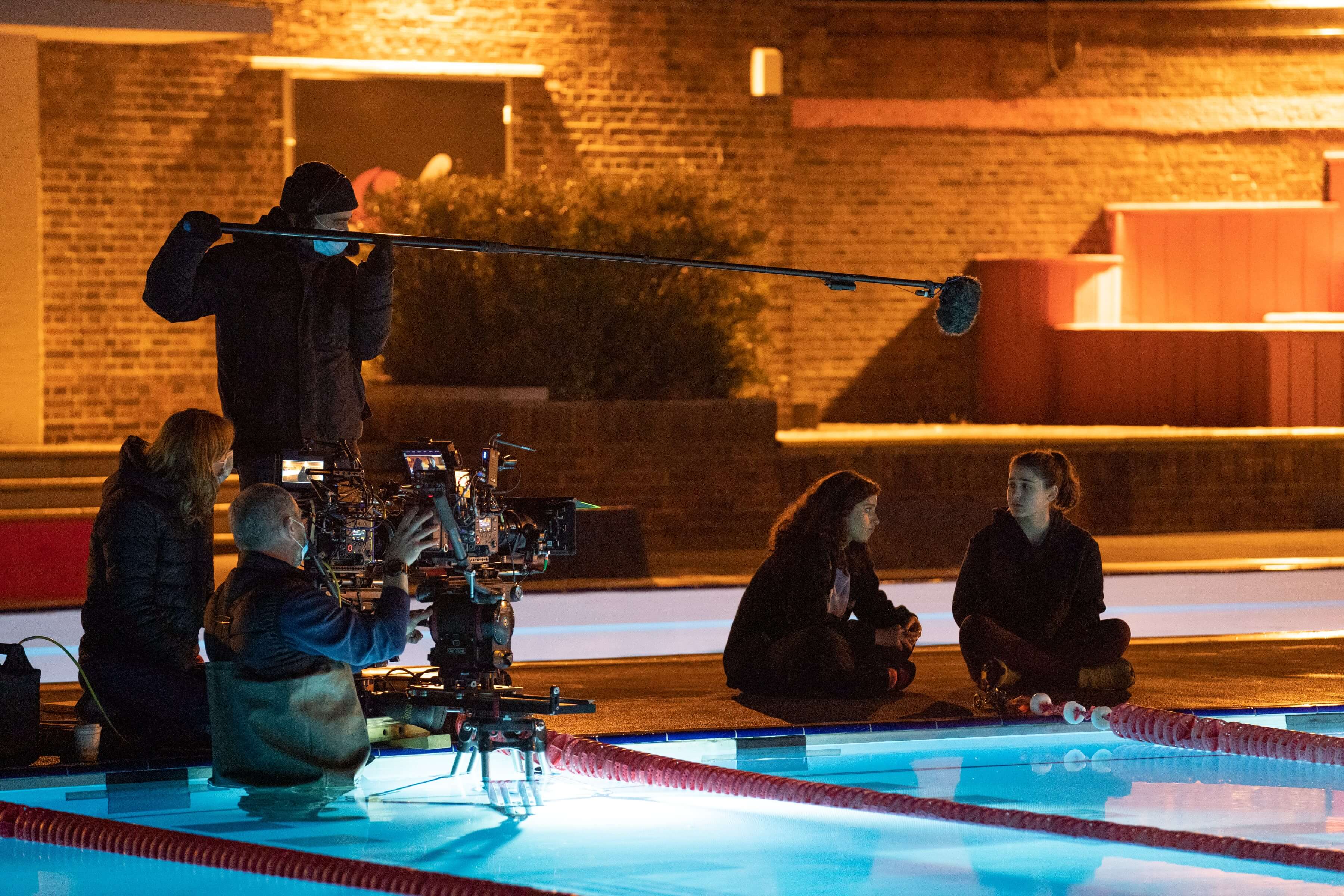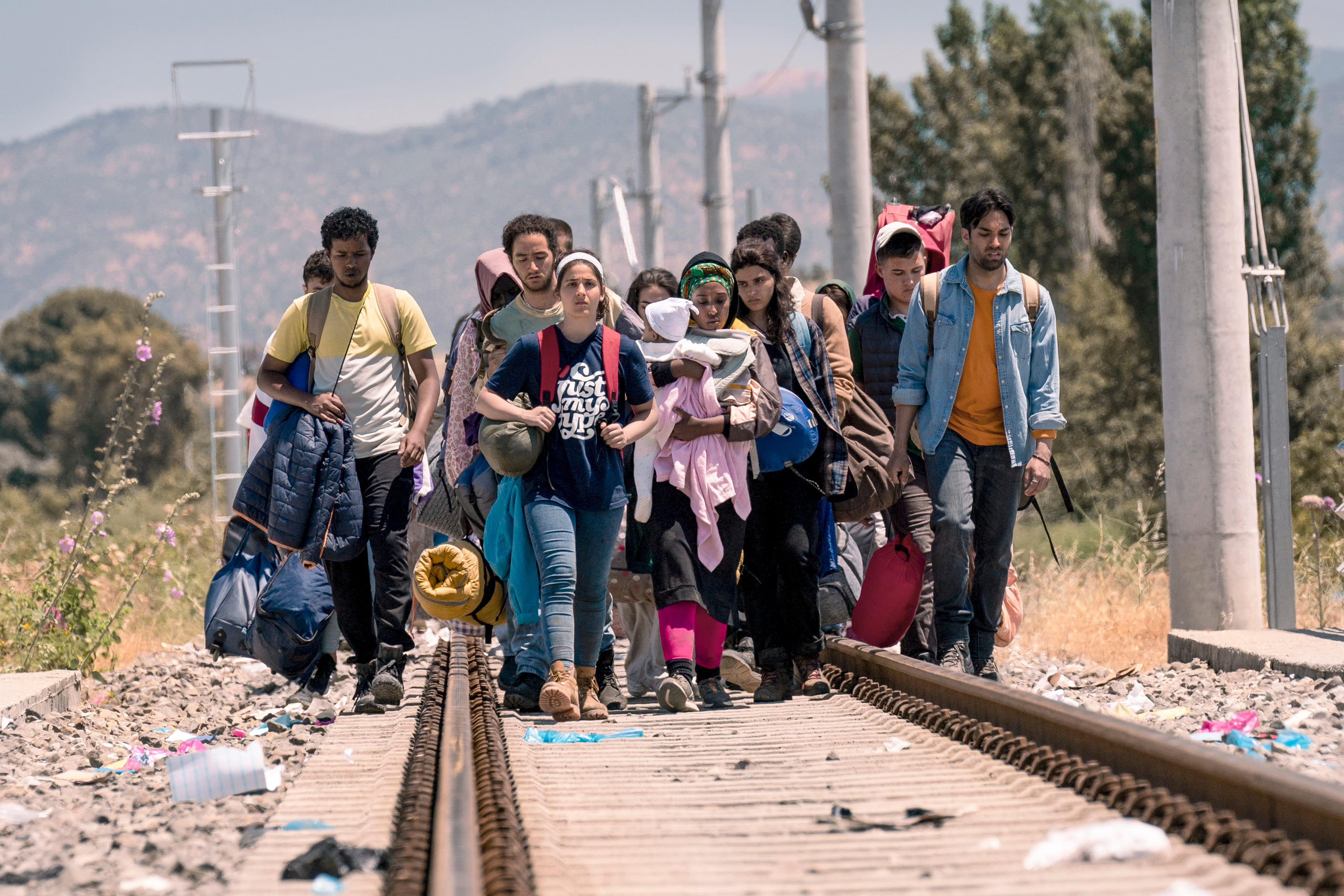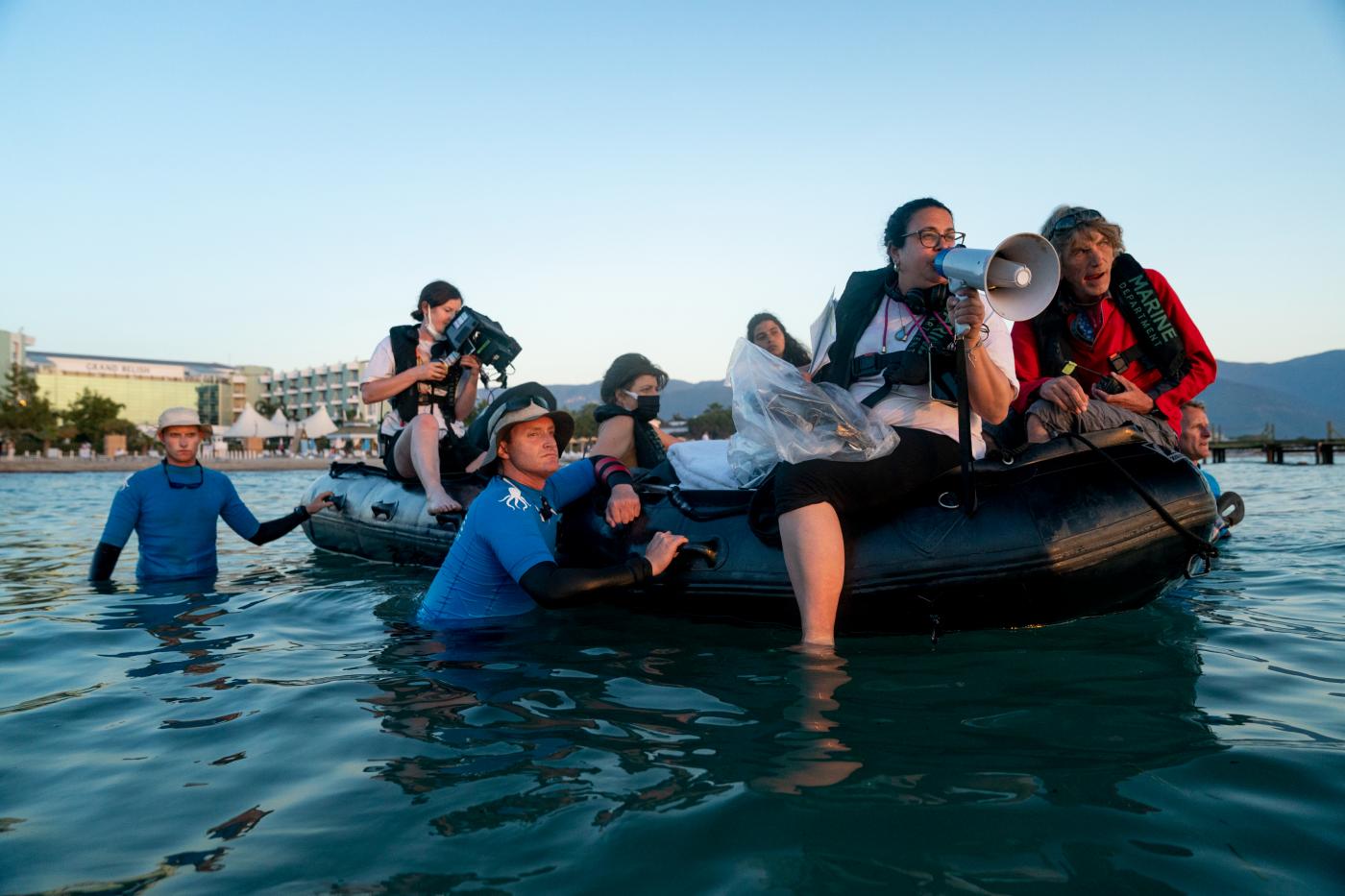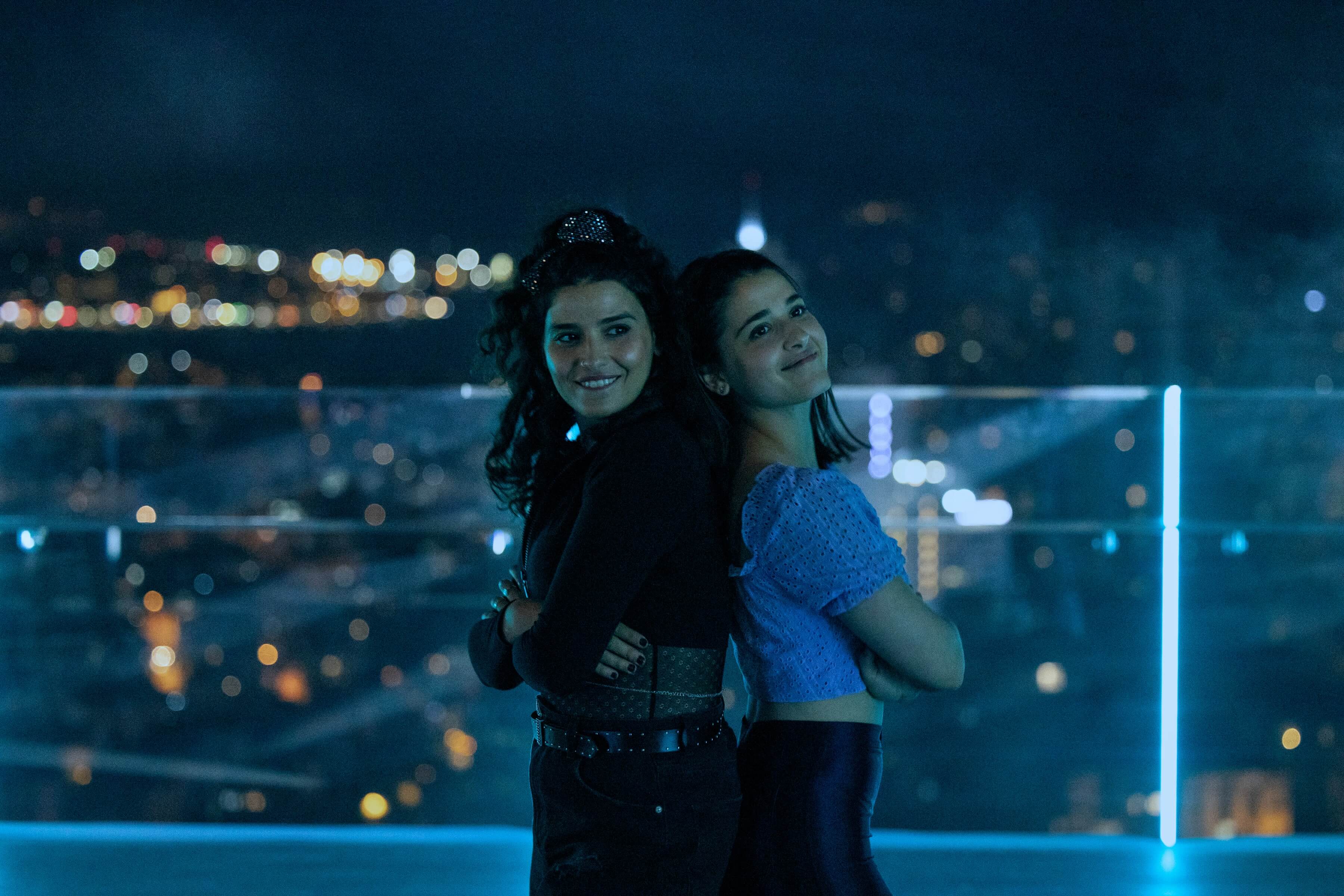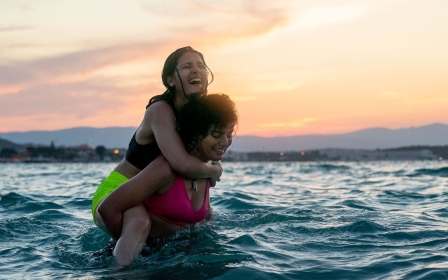The Swimmers: Lead actor hits out at 'orientalist cliches and mistreatment'
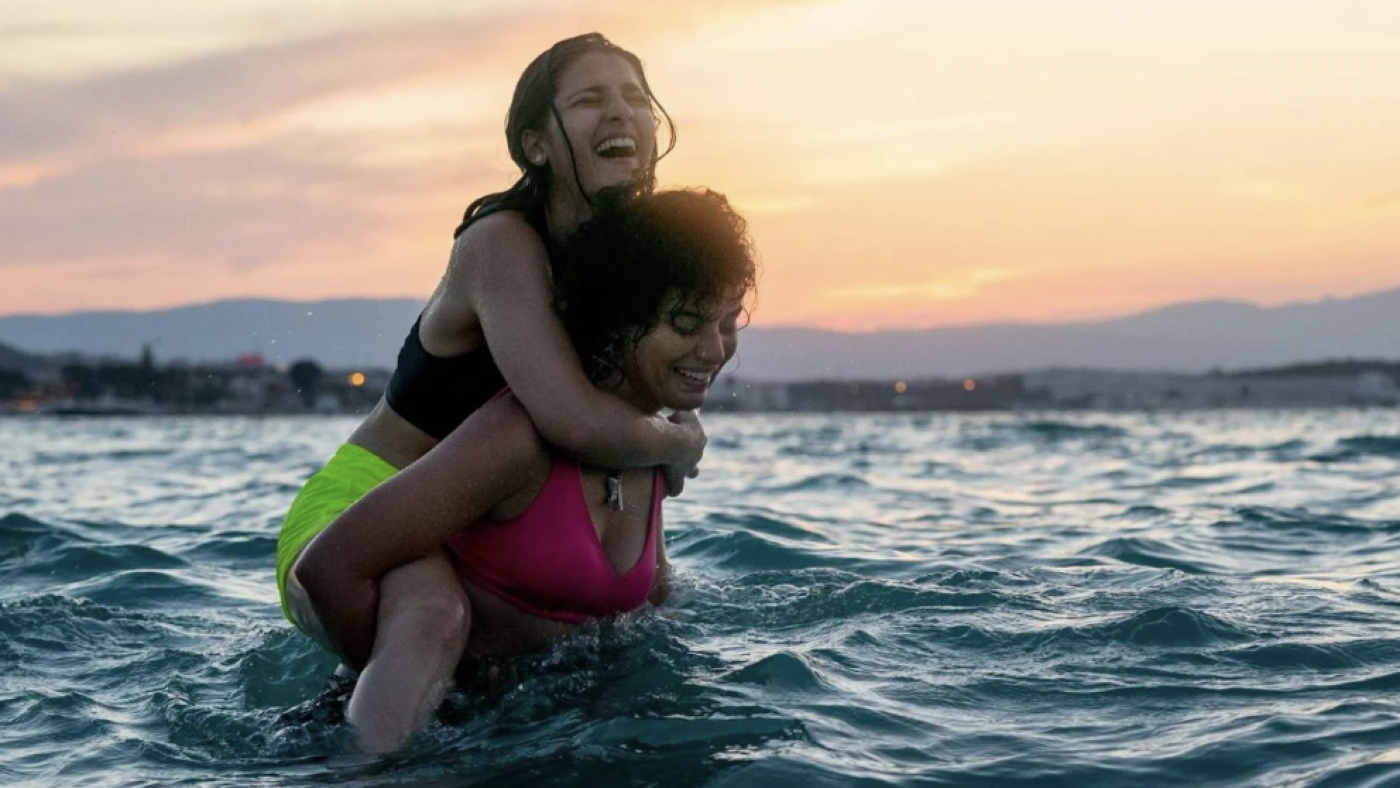
It was in July that I texted Manal Issa, a personal friend and colleague of mine to congratulate her on the news of The Swimmers, Netflix’s real-life chronicle of how Syrian refugee Yusra Mardini became an Olympic athlete, which has been chosen as the opening film of the Toronto International Film Festival (TIFF).
The response of the French-Lebanese star of the film, who plays Sara, the older sister, was not quite what I had expected. My excitement began to dissolve after Manal responded to my message. There was not a trace of elation or enthusiasm in her voice; on the contrary, she was dismissive, uncharacteristically aggressive and bitter.
When I eventually saw the film, the mocking and hostility in her voice made sense.
The film, now streaming on Netflix, is directed by Welsh-Egyptian filmmaker Sally El-Hosaini, yet has been on the receiving end of some scathing reviews. One review said it resembled a “Disney sports movie”, while another stated it had “clunky scenes and blank characters”.
But for Manal, the problems run far deeper.
New MEE newsletter: Jerusalem Dispatch
Sign up to get the latest insights and analysis on Israel-Palestine, alongside Turkey Unpacked and other MEE newsletters
‘Weak’ script and poor casting
Two weeks prior to the film’s Netflix streaming on 23 November, Manal reached out for the first time since the summer.
Despite battling with some personal issues, Manal was in a more composed mood. She wanted to openly talk about her experience in The Swimmers, but only after the film premiered to allow the viewers to form their own opinion of the film.
“I wouldn’t have reacted the way I did to your message if I was happy with the movie,” she later told me.
While she was cordial about El Hosaini, whom she gives credit for giving the film some dignity, it’s clear that The Swimmers raises questions about the relationship between white film executives and Arab talents; about the limited freedoms Arab creatives are given to tell their own stories, and about the type of stories American and British conglomerates allow Arab artists to tell.
Manal’s involvement with the project dates back to 2019 when she was sent the synopsis of the film by Universal Pictures - the Hollywood company that would later be replaced by Netflix - and Working Title, the famed British production house behind Four Weddings and a Funeral, Notting Hill, and Love Actually who have never previously produced an Arab story.
The initial script she received did not leave a memorable impression on her.
“It was no different than similar refugee-themed projects I receive every year,” Manal told me. “They talked to my agent after I turned it down to get me to audition for the film. I was still hesitant for multiple reasons: 1) It required extensive swimming lessons and 2) I felt uncomfortable that the role was not offered to a Syrian actor.” Manal didn't know how to swim prior to the film, so this was something she was apprehensive about.
Manal would eventually change her mind after conversing with El Hosaini who promised that she would take her input in the film’s making and work on the dialogue, which Manal thought was “weak” from the get-go. The script would not be changed however, El Hosaini was upfront, but with her help, she vowed to make the film as authentic as possible.
'I would’ve given the role up in a heartbeat had a Syrian been considered for the role, but that wasn’t the case'
- Manal Issa, actor
According to sources, the initial choice for Yusra was a French-Algerian star who struggled with both the English and the Syrian Arabic accent. Given the colossal differences between the Maghreb and Levant accents, the preliminary casting process showed little understanding of the region and caused some friction between El Hosaini and the production company.
“Most of the finalists for the role were from the Maghreb and Egypt. I finally decided to go for it because I felt that I was the one actress from the bunch that was closest to Sara,” Manal said. “I would’ve given the role up in a heartbeat had a Syrian been considered for the role, but that wasn’t the case.”
With no shortage of young talents in Syria – a leading country in Arab TV drama for nearly three decades – it was indeed peculiar that no Syrians were cast in the leading roles.
The producers could argue that they didn’t find Syrian talents with a good command of English, but that would raise question marks on the validity of the predominantly English dialogue the sisters communicate in. There’s only one Syrian actress in the film, Kinda Alloush, who plays the mother.
Lack of Arabic dialogue
Manal credits El Hosaini for increasing the dosage of Arabic dialogue in the script. Before these changes were implemented, Manal confronted one of the film’s British producers, saying, “So you want to make a movie about Arabs yet you don’t want to listen to their language?” she told him.
“I felt they [the American and British executives] don’t understand who we are and where we’re coming from,” she said.
“I was incensed by the number of times I was told that the dialogue sounded ‘cooler’ in English,” Manal said. “It was disrespectful and I felt insulted.”
I asked Manal what she thought of the script, which was written by British scribe Jack Thorne with El Hosaini receiving a co-writer credit.
“I was devastated by the excessive use of English dialogue and how superficial and cheesy it is,” she said. “It felt like one of those banal American films, filled with many orientalist cliches.”
Elements of these orientalist cliches can still be traced in the final film, most prominently in the cringeworthy scene when an African refugee tells Yusra: "You don’t wear hijab. You swim. I’ve never met a girl like you before.”
As casual as this scene may appear to be, it does force the critical viewer to wonder if Hollywood would have agreed to tell Yusra and Sara’s story had they been veiled, conservative and working-class.
For the Arab viewer, the English dialogue is not only distracting, it masks the drama with an indelible tint of phoniness. Syria was never a migrating nation; before the war, it was the mecca for learning Arabic. Conversing in English has never been part of Syrian life, neither at home nor in the subsequent exile.
The spuriousness of the English dialogue leaves a harmful impact on the performances, diminishing the emotional truthfulness of the drama and preventing the performers from fully immersing themselves into their characters.
Both Manal and her sister appear to be going through the motions every time they’re forced to utter the hammy English dialogue, constantly struggling to break free from the synthetic material.
Manal attempted to lend the material some naturality by changing the English dialogue into Arabic, but she was not allowed to.
‘Distorting the revolution’
Throughout the film, there is no mention of the word “revolution”, which has led Syrian intellectuals to accuse Netflix of “distorting the legacy of the revolution”.
For the unaware viewer that the film is targeted at, The Swimmers offers zero insight into how Syria became what it is now, and El Hosaini and Thorne never question the responsibility of the West in allowing the war to continue.
I asked Manal if the script had any discernible political point of view. “No, it didn’t,” she said. “In fact, earlier versions made it look as if Syrians are fighting each other for no reason.” But with no political context provided, that’s the exact political insinuation that comes across.
This lack of political context renders the Syrian situation indistinguishable from any other war, nullifying the plight of the Syrians and dehumanising their cause.
Aesthetically, The Swimmers does indeed look and feel like a Disney picture, replete with prettified imagery, slow-motion and excessive use of music. El Hosaini has no artistic aspirations and her picture is unabashedly mainstream, but her glossy approach – an ethically questionable strategy – tamps down the real horrors of illegal immigration.
I ask Manal if she thinks The Swimmers would have been a better film had it been an independent, non-Hollywood production. “I think so, yeah,” she said. “We had a lot of resources and a lot of money and a lot of talent involved, so it’s a shame the film didn’t turn out to be better, and it should’ve.”
A large part of the issue is that the film is a piece of mass entertainment catering for the widest possible audience; it's lazy and never challenges its idle viewers to question their apathy.
Invoking trauma and unequal pay
El Hosaini prides herself on trying to make the film as authentic as possible, and went as far as filming the crossing scenes at the Aegean coast and hiring some refugees for scenes.
However, this left Manal feeling uneasy for a number of reasons, one being the six hours of filming in the middle of the sea, where they actually saw people in boats trying to cross.
“Some cast members were crying; others felt queasy about communicating their discomfort. I reached a point where I felt it was all too much,” Manal said. “I told them you can’t invoke trauma by creating a new trauma for the performers; you don’t hurt people to just get a scene,” she said.
“The set should’ve had a psychologist to aid the actors, but there wasn’t. It was wrong; they took the actors for granted. I tried to have the shooting suspended, but I didn’t have the power to.”
'The set should’ve had a psychologist to aid the actors, but there wasn’t. It was wrong; they took the actors for granted'
- Manal Issa, actor
Another issue was the unequal pay some extras received.
When she asked the extras – who were comprised of Turks and Syrians, amongst others – how much they were paid, they told her it was around $10 a day. Manal absolves Netflix from the responsibility for this however, placing the blame on the hired Turkish casting agency
The second issue is her pay cheque. Issa was paid only $150,000 from which she received around $80,000 following tax deductions. That’s a measly sum for a multi-million Netflix and Working Title production.
More troublesome is the allegedly bigger pay cheque paid to a white European co-star who plays a smaller role in the movie than Issa. The actor told Issa he had initially refused a pay offer that was in the same ballpark as hers.
Middle East Eye reached out to Netflix through email and made multiple attempts to contact Working Title by phone to address the issues raised by Issa here but neither company has provided comment.
In spite of The Swimmers’ miscellaneous problems, Manal is proud of her work, content with the warm feedback she has received from viewers.
Flat characters
Besides the lack of authentic and Arabic language dialogue, another issue is the thinness of characters.
Yusra is presented as a goody-goody young woman with no blemishes. She experiences no tangible growth; she gains no insight about herself or the world around her. Her character is dull, one-dimensional and utterly unbelievable.
The key factors of class and religion – factors crucial to understanding the real sisters – are brushed off, robbing the characters of indispensable dimensions.
Sara, on the other hand, comes across as the sidekick whose sole raison d'etre is to bring her sister Olympic glory.
It’s an unflattering portrait that gives no justice to the real Sara, who found her calling in aiding fellow refugees - a plot point rashly rushed in the final story - and was arrested on the Greek island of Lesvos in 2018 after being accused by the local authorities of espionage and facilitating illegal immigration.
Manal believes that Sara was driven by deep-seated guilt over her new-found privilege as a legal immigrant – a guilt the script does not even hint at.
Neither Netflix, nor the filmmakers, have given any real attention to this.
Still, Manal loved what calls “the synergy” between the two sisters. She strongly connected with Sara – with her brokenness, vulnerability and repressed angst. Manal says she is able to understand what it feels like to be displaced, as she too was forced to leave her country Lebanon, for Europe.
In a recent Guardian opinion piece, which this writer found deeply reductionist and uncomfortably self-congratulatory, El Hosaini writes “Perhaps archaeologists 200 years from now will come across The Swimmers and it will go some way towards completing the picture in its depiction of young Arab women and refugees."
The reality, as conveyed by the film, is far from this outlandish, portentous claim that disregards the great work of various young Arab filmmakers who did not have the privilege of working with multi-million budgets like El Hosaini.
The past 10 years contained no shortage of great women characters in Arab films by both male and female filmmakers – characters that are more multi-dimensional, more genuine, more envelope-pushing, than El Hosaini’s feigned ciphers.
Oversimplistic narrative
So far, the bulk of the publicity for the film has centred on the accomplishments of Yusra, while Sara’s predicament, where she is facing criminal charges for her role saving refugee lives off the Greek Island of Lesvos, is left untouched. A guilty verdict could leave Sara in prison for 25 years.
Manal has been the only member of the cast to publicly address the issues Sara faces, while Netflix and the filmmakers have stayed silent on it.
She says that the messaging in the film is artificial.
“Let’s be frank, this message doesn’t need a movie to be delivered. Maybe the film could raise some awareness about refugees, but it won’t and can’t change anything.”
The film is by no means the first mainstream film to tackle the Syrian refugee crisis, yet despite extensive media coverage and countless films and books authored about the crisis, the Assad regime remains in power, unchallenged by a Western world that has been pushing to return its Arab refugees back to their disfigured nation.
The film comes across as puerile and over-simplistic, never delving into the thorny and complicated factors that transformed what started off as a mass revolution into a fully fledged war.
Manal's decision to speak out about the various issues in the film stems from a moral duty and a desire not only to improve the conditions of Arabic storytellers in Hollywood, but to propel the viewers to question what they see.
The Syrian regime was never held accountable for its crimes. There’s nothing celebratory about the Syrian condition, which is what the film leaves the viewers with; and Europe has not proven to be the promised land the film depicts it to be.
The Syrian outrage towards the film is understandable: The Swimmers is not a film made by Syrians or for Syrians: it’s a pompous projection of how Hollywood regards the Arab world.
This article is available in French on Middle East Eye French edition.
Middle East Eye delivers independent and unrivalled coverage and analysis of the Middle East, North Africa and beyond. To learn more about republishing this content and the associated fees, please fill out this form. More about MEE can be found here.


